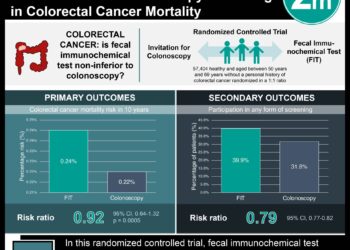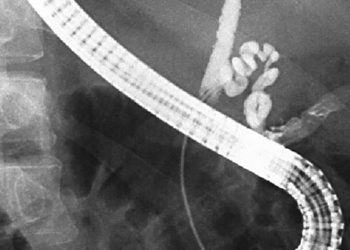Video capsule endoscopy is safe and effective in the initial evaluation of acute gastrointestinal bleeding during the COVID-19 pandemic
1. Use of video capsule endoscopy was associated with increased detection of bleeding and reduced use of personal protective equipment and exposure of staff to patients with COVID-19 compared to current standard of care (upper endoscopy and colonoscopy).
Evidence Rating Level: 2 (Good)
Study Rundown: The COVID-19 pandemic has shed new light on patient and staff safety practices in healthcare centers. The present study by Hakimian et al proposed that video capsule endoscopy (VCE) is a safer method of evaluating acute gastrointestinal (GI) bleeds in patients with COVID-19, as it is less invasive, requires less staff involvement and avoids aerosolization, compared to traditional diagnostic studies (colonoscopy and upper endoscopy). A multicenter retrospective cohort study of 146 patients was conducted to compare the safety and efficacy of VCE versus the current standard of care (SOC) for first line diagnostic evaluation of acute GI bleeding. Patient data was collected through chart review; 74 of the included patients were COVID-19 positive and had undergone VCE for investigation of an acute GI bleed, and 72 patients were historical controls who had undergone SOC (usually endoscopy) prior to the COVID-19 pandemic. The primary outcome of interest was detection of an active bleed and/or stigmata of recent bleeding. This was achieved in 44 (59.5%) of the patients in the VCE group and 18 (25%) of the patients in the SOC group. In the patients who first underwent VCE, 48.7% eventually needed invasive procedures, whereas 97.2% of the SOC patients needed invasive procedures. Rates of rebleeding, mortality as inpatients, decline in hemoglobin level or need for blood transfusion were not significantly different between groups. This study proposes an innovative approach to evaluating suspected acute GI bleeds. Due consideration is given to healthcare worker safety during the COVID-19 pandemic, and these principles can apply to infection control and prevention in the eventual post-pandemic world as well. It seems logical that VCE is associated with a higher detection rate of the source of upper GI bleeding as it can evaluate a more extensive portion of the GI tract than endoscopy than, and it is less dependent on operator skill compared to endoscopy. However, there are some flaws with this study as well. A relatively small sample size was used in combination with a retrospective study design, which are methodological factors that may introduce bias. Additionally, only hemodynamically stable patients were included; in most centers, endoscopy would be used for joint diagnostics and therapeutics in hemodynamically unstable patients presenting urgently, so VCE would not be helpful in that circumstance. Finally, access to VCE may be limited across centers as it is a newer technology than endoscopy.
Click to read the study in JAMA Network Open
Relevant Reading: The cost-effectiveness analysis of video capsule endoscopy compared to other strategies to manage acute upper gastrointestinal hemorrhage in the ED.
In depth [retrospective cohort study]: This study was conducted at two healthcare centers in the United States. Data was collected and stored using REDCAP software. Data was collected between March 15 and June 15, 2020 for the VCE group and between January 1 and January 31, 2020 for the SOC group. Invasive procedures were defined as one of the following: esophagogastroduodenoscopy, colonoscopy, enteroscopy, conventional angiography, surgery. Computed tomographic angiography and VCE were considered minimally invasive diagnostic assessments. Statistical analysis included multivariable logistic and linear regression to estimate odds ratios (OR). The OR for the primary outcome was 5.23 (95% confidence interval 2.23-12.27). Propensity scoring was performed including 54 matched patients in each group; this decreased the OR to 4.75 (95% confidence interval 2.02-11.14). The adjusted OR for needing invasive procedures in the VCE versus SOC was 0.01 (95% confidence interval 0.001-0.08). Interestingly, the distribution and source of bleeding was different in the COVID-19 intervention group patients compared to the control group. COVID-19 patients were more likely to have bleeding originate from the midgut. Angioectasias were the most common bleeding source in the COVID-19 group while peptic ulcer disease was predominant amongst non-COVID patients. The study assumed that 1 staff person was involved in administering VCE for each patient and that 4 staff persons were involved with the SOC group. Based on this assumption, 250 staff encounters occurred with the COVID-19 patients and 344 with the controls. They estimated that VCE was associated with a 30% decrease in use of personal protective equipment.
Image: PD
©2021 2 Minute Medicine, Inc. All rights reserved. No works may be reproduced without expressed written consent from 2 Minute Medicine, Inc. Inquire about licensing here. No article should be construed as medical advice and is not intended as such by the authors or by 2 Minute Medicine, Inc

![2MM: AI Roundup- AI Cancer Test, Smarter Hospitals, Faster Drug Discovery, and Mental Health Tech [May 2nd, 2025]](https://www.2minutemedicine.com/wp-content/uploads/2025/05/Untitled-design-350x250.png)





